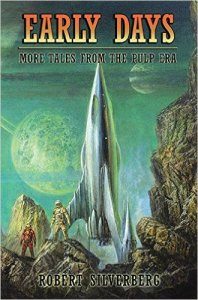Paul Di Filippo reviews Alvaro Zinos-Amaro and Robert Silverberg
Traveler of Worlds: Conversations with Robert Silverberg, by Alvaro Zinos-Amaro (Fairwood Press 978-1933846637, $16.99, 280pp, trade paperback) August 2016
Early Days: More Tales from the Pulp Era, by Robert Silverberg (Subterranean 978-1596067998, $20.00, 344pp, hardcover) August 2016
 Pick one of your favorite deceased writers. The only criteria for the selection is that the person should be somewhat underserved by the historical record. In other words, no chatterboxes like Mark Twain or George Bernard Shaw or John Updike or Virginia Woolf, who left scads of personal information behind. Now imagine you could get a big new volume from your fave writer, a book that held the transcriptions of long conversations he or she had conducted with an intelligent and witty interlocutor. Conversations revelatory of both personal and literary history, evocative of a vanished era. Wouldn’t you be thrilled at this fresh insight into their character and career?
Pick one of your favorite deceased writers. The only criteria for the selection is that the person should be somewhat underserved by the historical record. In other words, no chatterboxes like Mark Twain or George Bernard Shaw or John Updike or Virginia Woolf, who left scads of personal information behind. Now imagine you could get a big new volume from your fave writer, a book that held the transcriptions of long conversations he or she had conducted with an intelligent and witty interlocutor. Conversations revelatory of both personal and literary history, evocative of a vanished era. Wouldn’t you be thrilled at this fresh insight into their character and career?
Well, future fans and critics and historians are going to be very glad that Alvaro Zinos-Amaro has compiled just such a volume with Grand Master Robert Silverberg. In the fine oral tradition exemplified by previous interviewers such as Charles Platt (Dream Makers) and Darrell Schweitzer (Speaking of the Fantastic), Zinos-Amaro probes his subject with well-educated, perceptive questions about everything under the sun, eliciting a telling verbal portrait of both men in the process.
The conversation flows like a natural convention-barroom gabfest, contoured more artfully by the intelligent direction of Zinos-Amaros’s questions. The easygoing readability of the dialogue derives in large part from the fifteen-plus years of friendship between the men. In any case, some segregation of topics has been achieved by division into seven chapters on various themes, such as “The Vividness of Landscape” and “After the Myths Went Home.”
We veer from the charmingly quotidian—at what hour the newspapers arrive on the Silverberg doorstep—to the loftily metaphysical: what are the meanings of age and time, where is the culture heading? Along the way, Silverberg offers commentary on his peers and literary ancestors—who was the greater writer, Balzac or Zola; who was more clumsy, HPL or ERB?—the state of world affairs, and the pleasures of carnality. Because these talks are all of quite recent vintage, we are getting the views of a Lion in Winter, the eighty-year-old who contains the fifty-, forty- and eighteen-year-old man within his current avatar. It’s a multiplex performance, touching in in its evocation of the Seven Ages of Man.
Zinos-Amaro generously throws open the floor to questions from “the audience.” He never insists on forcing the conversation down predetermined paths if more alluring detours arise. And he is utterly simpatico with his older peer. In short, this book is the next best thing to hanging out with Silverberg himself, and a vital addition to the historical record of our genre. We see a portrait of a fellow blessed with talent, morals, ironic humor and grand passion for this genre of ours.
Many kudos also to Patrick Swenson at Fairwood Press for making this happen.
* * *
 The perfect companion to Traveler of Worlds is Early Days, a sequel of sorts to 2004’s In the Beginning, which brought us a healthy heaping of Silverberg’s earliest, never-before-reprinted sales. Now we get nearly a score more of these pulpish outings, along with copious story notes that vividly conjure up that brightly colored vanished era, retroactively perceived as a second Golden Age. The fascinating thing about these tales is how they look both backwards, towards the SF of the 1930s and 1940s, and proleptically forward, towards the more variegated and sophisticated stuff of the 1960s and 1970s. Trembling at the interface of change, they prove that the 1950s was indeed the pivotal decade which Gary Wolfe’s Library of America volumes adduce it to be.
The perfect companion to Traveler of Worlds is Early Days, a sequel of sorts to 2004’s In the Beginning, which brought us a healthy heaping of Silverberg’s earliest, never-before-reprinted sales. Now we get nearly a score more of these pulpish outings, along with copious story notes that vividly conjure up that brightly colored vanished era, retroactively perceived as a second Golden Age. The fascinating thing about these tales is how they look both backwards, towards the SF of the 1930s and 1940s, and proleptically forward, towards the more variegated and sophisticated stuff of the 1960s and 1970s. Trembling at the interface of change, they prove that the 1950s was indeed the pivotal decade which Gary Wolfe’s Library of America volumes adduce it to be.
As Silverberg himself notes, various themes and motifs recur among these selections, mainly thanks to their being deliberately tailored for various markets. The ones he was writing for Super-Science, for instance, all involve human missions to weird alien worlds, where unpredictable matters of biology and culture lead to disaster. “Slaves of the Tree” might be the standout in this category. As I mentioned, it looks backwards just a bit, to then-recent revolutionary work by Philip Jose Farmer (“Mother” and The Lovers) and, with its focus on exogamy, anticipates James Tiptree.
But young Silverberg ranged widely. “Puppets Without Strings” is an exercise in surreal solipsism worthy of Leiber or Heinlein or Dick. “Housemaid No. 103” might have come from the pen of Sheckley. A. E. van Vogt seems to have had a hand in “Six Frightened Men.” In short, the apprentice Silverberg can be seen channeling his influences while still putting a unique stamp of vision and personality on his narratives. And as he proudly affirms in his notes, his dedication to the nuts-and-bolts craftsmanship of storytelling is exemplary.
Silverberg also cites the fact that these beginner pieces show his mature themes in utero. A tale like “Waters of Forgetfulness,” wherein humans capitulate to the seduction of an alien environment, looks forward to a novel like Downward to the Earth.
Like his coeval Algis Budrys, Silverberg brought a more-educated, “Ivy League” background to a field formerly dominated by talented amateurs and technologically minded professionals. With role models like Joseph Conrad and Somerset Maugham, Silverberg lifted the bar for what SF could do. His role in elevating and transforming the art form is incontestable and mighty. They don’t hand out those Grand Master Awards for nothing, you know.
But perhaps even more important, these stories remain utterly entertaining. I only wish some of the crime tales which Silverberg alludes to had been included. But that might very well be another volume for the excellent Bill Schafer at Subterranean to produce!








Thank you for this. I just ordered the Zinos-Amaro book and have “Early Days” in my basket. RS has been my favorite SF writer for years. I taught his novel “Nightwings” in my high school SF elective and currently have “The Secret Sharer and others” in my car’s cd player. A wonderful writer, wise, worldly, metaphysical, profound, literary. An exquisite craftsman who brings characters to life in new worlds that are utterly believable.